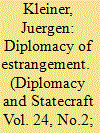| Srl | Item |
| 1 |
ID:
062353


|
|
|
| 2 |
ID:
121421


|
|
|
|
|
| Publication |
2013.
|
| Summary/Abstract |
Diplomatic correspondence between Washington and the American Embassy in Islamabad published by the National Security Archive shows that during the last 35 years of the twentieth century American diplomacy toward Pakistan faced a mutually de-escalating relationship. Pakistan wanted American economic and military assistance as well as support in its conflicts with India. The United States was ready to aid Pakistan, but only so far as Islamabad respected American demands. These focused on containing Soviet influence in the region and, more recently, fighting al-Qaeda and the Taliban. The United States also asked Pakistan to refrain from manufacturing nuclear weapons. To enforce this policy, successive American administrations showered Pakistan with sanctions. These sanctions were lifted again and again, because they undercut American diplomatic influence with the Pakistani government. Washington did not intend to support Pakistan in its conflicts with India. Pakistan let down the United States by not using its leverage over the Taliban to capture Osama Bin Laden. Mistrust resulting from this roller coaster relationship should have warned American diplomats not to take Pakistan's support in the war in Afghanistan against al-Qaeda and the Taliban for granted.
|
|
|
|
|
|
|
|
|
|
|
|
|
|
|
|
| 3 |
ID:
075853


|
|
|
|
|
| Publication |
2006.
|
| Summary/Abstract |
As South Korea became economically and militarily stronger and developed democratic institutions, the country was in a position to assume more responsibilities in its partnership with the United States. The necessary changes could be achieved only with difficulties. The efforts of the US administration to stop the nuclear proliferation by North Korea and South Korea's attempts to develop a policy of engagement towards the DPRK resulted in friction between the allies. The dissonance was amplified by efforts of the Rho Moo Hyun government to pursue a foreign policy that was less dependent upon the United States. The change of atmosphere was underlined by anti-American outbursts in South Korea. A new effort to strengthen the partnership is, however, reasonable. For South Korea the United States is still the indispensable ally as long as an attack by North Korea that probably has nuclear weapons cannot be ruled out. For the United States this alliance contributes to maintain America's paramount influence in East Asia. If both countries agree with this rationale they should take steps to accept basic assumptions and policies of the other side. To find a common position towards the nuclear efforts of North Korea is crucial. Even if both sides try to harmonize their policies, success is not guaranteed. Korean nationalism and American dynamics combined with occasional high-handedness are difficult obstacles.
|
|
|
|
|
|
|
|
|
|
|
|
|
|
|
|
| 4 |
ID:
135857


|
|
|
|
|
| Summary/Abstract |
After having participated in the civil war and later ruled Afghanistan in the 1990s, the current Taliban have a third life as insurgents against the Afghan government and its foreign supporters. Their aim is to return to power and establish an Islamic system. Pakistani shelter and support, guerrilla warfare, and terrorist tactics allowed the Neo-Taliban to extend their influence, particularly to the south and east of Afghanistan. They used the weakness of the Hamid Karzai regime to set up shadow governments. Since even the coalition forces have abandoned the aim of defeating them, the Taliban are guaranteed survival after foreign combat troops leave Afghanistan at the end of 2014. Due to the different interests of the main stakeholders—the Afghan government, the Taliban, the United States, and Pakistan—it is unlikely that the conflict will end by negotiations any time soon. Thus, the civil war will continue. When the Taliban try to extend their reach beyond rural areas and into non-Pashtun districts, they will meet tough resistance. Therefore, it is likely that the fragmentation of Afghanistan will persist and that the Taliban will not return as rulers of a united Afghanistan.
|
|
|
|
|
|
|
|
|
|
|
|
|
|
|
|
| 5 |
ID:
076730


|
|
|
|
|
| Publication |
2007.
|
| Summary/Abstract |
Pakistan faces many problems. The struggle over the country's Islamic dimension is undecided. Pakistan continues to be a hotbed of Islamic fervor. As evidenced by the frequent interruptions of civilian rule by military regimes the country is not sure which course to follow. Violence has become Pakistan's trademark. The jihadi culture is frightening. Poverty and underdevelopment are wide spread. The educational system is a mess. Integration of the different ethnicities has not been completed. Enmity characterizes the relationship to India, mistrust that to Afghanistan. Its nuclear weapons capability is looked upon with suspicion by Western countries. Fundamental changes will only be possible if Pakistan finds its way to democracy.
|
|
|
|
|
|
|
|
|
|
|
|
|
|
|
|